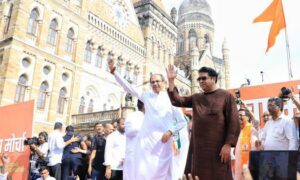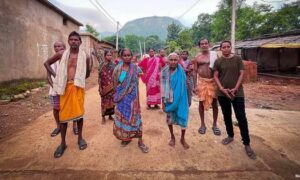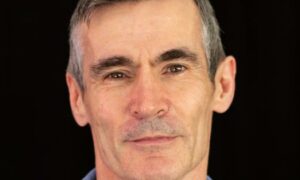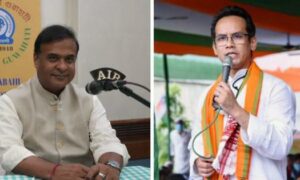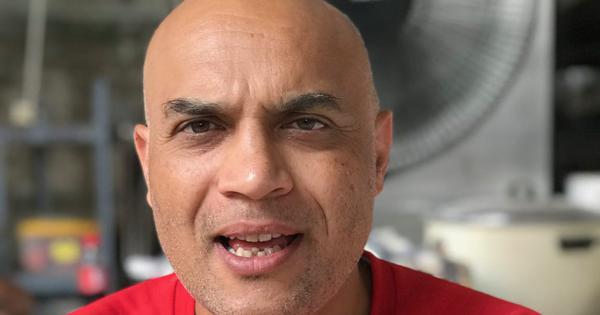
The old man lies on the ground, arms and legs splayed, glistening with dew. The hoops of metal binding his wrists and feet in a cross are unforgiving, and he no longer struggles. A procession of ants march over his bowlegs and his head is caked in bird droppings.
The American – was her name Darryl or Diane – hands me a pair of pruning secateurs.
“You say you want to join us. Cut off one of his fingers. That’s what happens to staff who steal from hotel guests.”
In the east daggers of red and orange light up the sky, heralding the sun’s arrival. The cawing of bulbs and koels fills the air. I take the tool.
This time yesterday, I was on the other side of the island, in a different world outside the Hotel Wall.
I wipe Sitadweep Island’s endless heat off my brow with an old T-shirt. It’s early evening and the entire village has gathered at the meeting place. A hush has lain over the village like a pall since the afternoon, when the sound of Sunil’s baby daughter’s slowly dimming cries fell silent.
“The Hotel killed our daughter. We want justice.” The petitioner Sunil waves his cutlass about, daring anyone to contradict. He wears just a dhoti; his taut body glistens with sweat and sways with alcohol. He is just two years older than me, but as the head of a household, the village panchayat must hear his grievance.
The Panchayat’s Pradhan raises his hand. “Waving the blade around won’t bring her back. We must discuss the matter calmly.”
“They’ve sucked the boreholes dry.” The baby girl died of heat stroke, just a week shy of her first birthday. Though I barely know Sunil or his wife, imagining their grief, my eyes well up.
Today, the thermometer shows 45 degrees. The village is used to heat. The huts shelter beneath a dense cooling canopy. The rammed-earth walls’ subtle angles magnify the sea breeze. But not even the tribes’ ingenuity can overcome the dry wells. Monsoon, when our water harvesting devices can replenish our tanks, is still a month away.
If only we could contact mainland India and get help, but all contact – data, imported power, and even the boats abruptly ended two years ago. The rest of the world has forsaken us. Luckily for us, before the link to India’s power grid was established, BJP and Congress politicians took turns showering the island with solar arrays and lithium-ion batteries. So at least we have ample electricity.
“The Hotel pumps our groundwater to water its lawn,” an elder growls.
“So they can play golf,” somebody else says.
The elder resumes. “It has a desalination plant. But they choose not to use it.” He gives the crowd a wild-eyed stare. “They want us dead so they can take over the entire island. Are we going to let them?”
I clench my jaw. The idea that the Hotel’s inhabitants would water a golf course during a drought is preposterous, but such is the villagers’ mistrust that they’ll believe any wild story.
“Let the foreigner speak,” Aditi, sitting next to me, says.
“Why would the Hotel do that?” I stammer, self-conscious about my imperfect command of their language. “Except for the week after the Collapse, the people there have never harmed us.”
“They shot Bhaskar dead.”
Aditi whispers, “The idiot went to the Hotel’s back gate in the pitch dark. I‘d have shot the bhoot.”
“He just wanted to talk to them.” An old man turns on her, his stare boring into her.
Unlike the villagers, I have actually stayed in the Hotel. I was a guest there for my first two nights in Sitadweep. The people within are not devils. Its clientele consists of wealthy Indian and foreign tourists; its staff come from all corners of India. The trauma of the Collapse must have terrified the Hotel’s inhabitants, just as it did us.
“We can pay them to stop their pumping.”
“With what? Goats?” somebody else scoffs.
The anger is contagious, and no one, not even the level-headed pradhan, wants a peaceful solution. I am terrified. The villagers’ only weapons are farming tools, but I have seen their efficiency when hunting boars or dispatching chickens. They know how to kill.
The meeting closes with an agreement to storm the Hotel compound and destroy the hotel’s groundwater abstraction pumps at first light. Blood will be shed. The Hotel’s tall concrete perimeter walls have been augmented with watchtowers housing armed guards.
After the meeting, the pradhan’s nephew, a shy, wide-eyed twenty-something, approaches me. “I have something to show you.” We go to a clearing in the forest where he grows vegetables. There’s a wardrobe-sized cobweb of nylon and steel wires gently angled over a trough funnelling a dribble of clean water into a jar. It is a miracle. “It’s a dew-catcher. It collected three litres yesterday.” His bright eyes glisten, and I notice his unchapped lips and ruddy skin; quite unlike the parched village’s other inhabitants. “Don’t you get it? If we can make enough of these he can supply enough drinking water to survive until the rains come. We don’t have to fight the Hotel.”
“Why are you telling me this?”
I see an ancient anxiety etch his face. “Talk to my uncle. You’re a foreigner and a graduate. He’ll believe you.”
I look at the delicate tangle of wires and see the impracticality of his suggestion.
“I will talk to your uncle.”
The Pradhan is busy and I wait my turn to talk to him. “May I ask you something, sir?”
He puts his mottled arm around my shoulders. “You don’t have to fight if you don’t wish to.”
“Of course, I’ll fight with you. This is my home now.” I bristle. “It’s not that…”
“You know I think of you as my son.” He slaps me on the back. “Good.” Someone else demands his attention and he turns away before I can say anything further.
I go back to my hut. Around me, villagers make incendiary arrows and Molotov cocktails from old bottles and coconut oil. The thought of the impending bloodshed sickens me.
I am too hot and restless to sleep. After an hour of tossing, I root around my rucksack. I creep out of the village and approach the Hotel. Only I can be an ambassador between the village and the Hotel.
There’s a rustle from behind. I stand motionless. Did someone hear me leave?
Impossible. The villagers are resting for tomorrow’s battle. I approach the hotel wall, raising my arms, holding my passport and the top-of-the-range VR kit my parents gifted me before I set off for Sitadweep. Since the Collapse, it no longer connects with the hypernet, but the games, music and old photos cheer me up when I am down.
“Hello,” I say in my best English accent. “I want to talk.”
I hear twigs crackling above me. A heavy net drops; seconds later, someone covers my face with a cloth doused in ether.
When I wake, my hands and feet are bound with nylon rope. My head howls with pain. I open my eyes. I am in the Hotel’s outdoor bar area on one of the sofas. It’s night, and the full moon illuminates my surroundings. A thirty-something woman sits beside me. A waiter hovers in the background.
“You’re awake. The guard said you speak English.” Her accent is Californian.
“Thank God, you saved me!” I give her my biggest smile, but get nothing from her. She’s angry but I think this is her disposition rather than an indictment of me.
“You’re British! I wondered how the tribals got their hands on those.” She gestures to my passport and VR set. It sees me and displays the time; it’s an hour before sunrise. “My name is Dorothy, but everyone calls me Darryl.”
She helps me sit up, but leaves my legs and hands bound. Her once plump face looks lined and wrinkly, like the air has been released. Her shorts are threadbare and are held onto her skinny frame by a rope.
“My name is Akash Deshpande. I’m from North London.”
She probes my face. “What are you doing in the village?”
“Field work for my PhD on sustainable water management. I’m an Earth systems engineer. I came to Sitadweep a few months before the Collapse but got trapped like you.”
“Collapse! Is that what you call it? You’ve no idea what happened, do you?” She studies my dumbfounded expression.
“The AIs went to war on humanity. It took them fifteen minutes to turn off the 21st century.”
And send us back to the stone age, I say to myself.
Excerpted with permission from ‘Hotel Wall’ by Prashant Vaz in Earthbound: Climate Stories from South Asia, edited by Alina Gufran, Storiculture.
📰 Crime Today News is proudly sponsored by DRYFRUIT & CO – A Brand by eFabby Global LLC
Design & Developed by Yes Mom Hosting

